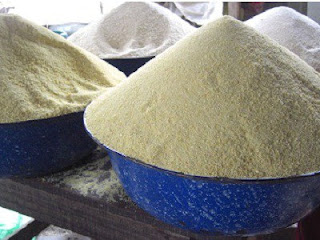December Good News: Garri Prices Now Reduced With 100% Amount In Ekiti
A taskforce led by the President of the Market
Women Association , Chief Omowaye Oso ,
yesterday stormed two major markets in Ekiti
state , to force the reduction in the prices of food
stuff in the state .
Oso and her team stormed the market after the
market women increased the prices of their
commodities by 100 % blaming it on high dollar
rate. Speaking to newsmen after the forceful
reduction, Oso said ;
“Both the Ewi of Ado Ekiti and the state
government are concerned about the
exorbitant prices of goods and services in the
town . The cost of goods , especially foodstuff ,
is too high in Ado Ekiti, whereas , as the state
capital , prices of goods and services should
be the cheapest here . The market men and
women should have mercy on the poor
because things are too expensive here, unlike
other towns and villages in Ekiti State . It is
very unfortunate that market women in other
communities don’ t want to sell at their
places anymore ; they now bring their wares
to Ado , believing they will sell at twice the
price of what they sell in their communities .
As the Iyaloja, one of my responsibilities is to
ensure price control of goods and today ’ s
exercise shall be a continuous one and shall
be repeated in all markets in Ado . It is
unfortunate that 20 liters of palm oil which
sells at N14 , 000 in Ikole is being sold at
N22 , 000 in Ado , but we have sold it at
N15 , 000. Ado is now developing a bad
reputation for high prices of goods and
services, but we will not allow this to
continue . The Kabiyesi has said he does not
want hardship for the people of Ado . We will
continue to carry out our raids until our
market women comply and anyone who
cannot comply, must look elsewhere to sell
her wares . If you can’ t sell your palm oil at
lower prices , don ’ t bring it down to Ado
again ,” she said . A measure of garri which
used to sell for N 200 was reduced to N 100. A
20- liter container of palm oil which sold at
N22 , 000 was reduced to N 15, 000, while a
measure of local rice, which initially sold at
N500 was reduced to N400 .

Comments